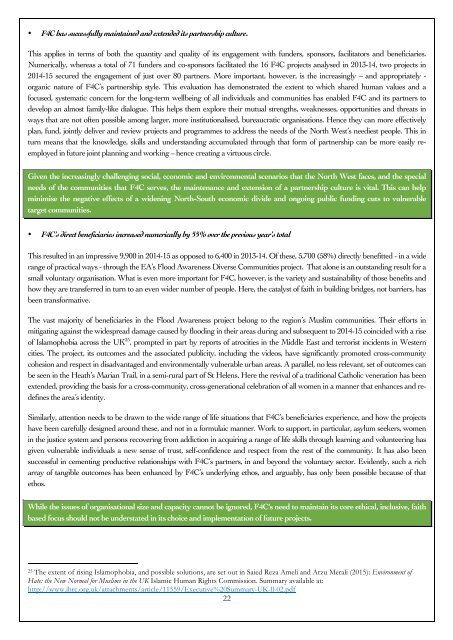Programme Evaluation 2014-15
Create successful ePaper yourself
Turn your PDF publications into a flip-book with our unique Google optimized e-Paper software.
• F4C has successfully maintained and extended its partnership culture.<br />
This applies in terms of both the quantity and quality of its engagement with funders, sponsors, facilitators and beneficiaries.<br />
Numerically, whereas a total of 71 funders and co-sponsors facilitated the 16 F4C projects analysed in 2013-14, two projects in<br />
<strong>2014</strong>-<strong>15</strong> secured the engagement of just over 80 partners. More important, however, is the increasingly – and appropriately -<br />
organic nature of F4C’s partnership style. This evaluation has demonstrated the extent to which shared human values and a<br />
focused, systematic concern for the long-term wellbeing of all individuals and communities has enabled F4C and its partners to<br />
develop an almost family-like dialogue. This helps them explore their mutual strengths, weaknesses, opportunities and threats in<br />
ways that are not often possible among larger, more institutionalised, bureaucratic organisations. Hence they can more effectively<br />
plan, fund, jointly deliver and review projects and programmes to address the needs of the North West’s neediest people. This in<br />
turn means that the knowledge, skills and understanding accumulated through that form of partnership can be more easily reemployed<br />
in future joint planning and working – hence creating a virtuous circle.<br />
Given the increasingly challenging social, economic and environmental scenarios that the North West faces, and the special<br />
needs of the communities that F4C serves, the maintenance and extension of a partnership culture is vital. This can help<br />
minimise the negative effects of a widening North-South economic divide and ongoing public funding cuts to vulnerable<br />
target communities.<br />
• F4C’s direct beneficiaries increased numerically by 55% over the previous year’s total<br />
This resulted in an impressive 9,900 in <strong>2014</strong>-<strong>15</strong> as opposed to 6,400 in 2013-14. Of these, 5,700 (58%) directly benefitted - in a wide<br />
range of practical ways - through the EA’s Flood Awareness Diverse Communities project. That alone is an outstanding result for a<br />
small voluntary organisation. What is even more important for F4C, however, is the variety and sustainability of those benefits and<br />
how they are transferred in turn to an even wider number of people. Here, the catalyst of faith in building bridges, not barriers, has<br />
been transformative.<br />
The vast majority of beneficiaries in the Flood Awareness project belong to the region’s Muslim communities. Their efforts in<br />
mitigating against the widespread damage caused by flooding in their areas during and subsequent to <strong>2014</strong>-<strong>15</strong> coincided with a rise<br />
of Islamophobia across the UK 25 , prompted in part by reports of atrocities in the Middle East and terrorist incidents in Western<br />
cities. The project, its outcomes and the associated publicity, including the videos, have significantly promoted cross-community<br />
cohesion and respect in disadvantaged and environmentally vulnerable urban areas. A parallel, no less relevant, set of outcomes can<br />
be seen in the Heath’s Marian Trail, in a semi-rural part of St Helens. Here the revival of a traditional Catholic veneration has been<br />
extended, providing the basis for a cross-community, cross-generational celebration of all women in a manner that enhances and redefines<br />
the area’s identity.<br />
Similarly, attention needs to be drawn to the wide range of life situations that F4C’s beneficiaries experience, and how the projects<br />
have been carefully designed around these, and not in a formulaic manner. Work to support, in particular, asylum seekers, women<br />
in the justice system and persons recovering from addiction in acquiring a range of life skills through learning and volunteering has<br />
given vulnerable individuals a new sense of trust, self-confidence and respect from the rest of the community. It has also been<br />
successful in cementing productive relationships with F4C’s partners, in and beyond the voluntary sector. Evidently, such a rich<br />
array of tangible outcomes has been enhanced by F4C’s underlying ethos, and arguably, has only been possible because of that<br />
ethos.<br />
While the issues of organisational size and capacity cannot be ignored, F4C‘s need to maintain its core ethical, inclusive, faith<br />
based focus should not be understated in its choice and implementation of future projects.<br />
25 The extent of rising Islamophobia, and possible solutions, are set out in Saied Reza Ameli and Arzu Merali (20<strong>15</strong>): Environment of<br />
Hate: the New Normal for Muslims in the UK Islamic Human Rights Commission. Summary available at:<br />
http://www.ihrc.org.uk/attachments/article/1<strong>15</strong>59/Executive%20Summary-UK-ll-02.pdf<br />
22


